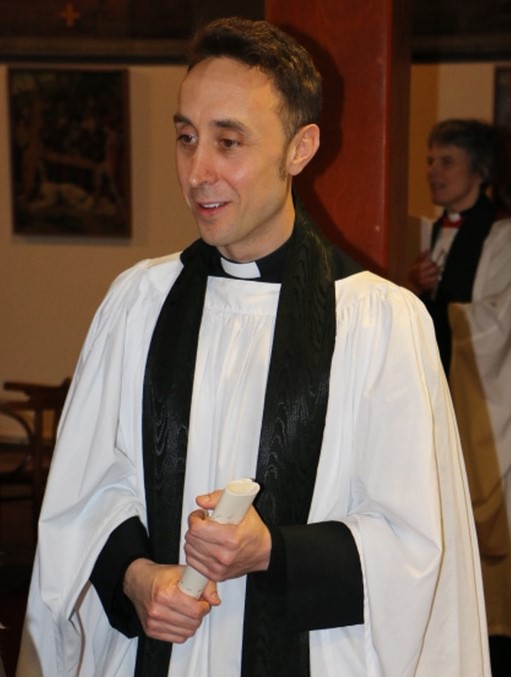The Revd Chris Moore recalls the striking results of surveying his fellow ordinands about animal issues whilst at theological college and urges us to include all God’s creatures in the life and mission of the church.
When I was an ordinand at Westcott House Cambridge, I conducted a questionnaire of 100 ordinands across the Cambridge Theological Federation. The aim of my questionnaire was to establish the degree to which the practices of the Anglican Church and the faith of its members, support animal rights. 60% of the respondents reported that their sending parish churches offered no worship services which were either dedicated to or made any reference to animals. This result is scandalous. A careful exegesis of Genesis 1 demonstrates that our most fundamental affirmation as human beings is that God is creator and we are His creatures. Therefore, the world of creation, and animals especially, should be made more visible in our worship. The shape, the language, and the structure of liturgy, which so often focuses on human beings, must be reshaped so as to reflect God’s providential care for the whole of creation, including animals. Until it does, human beings risk distorting the divine image in which they are created, an image which demands from us the fulfilment of clear injunctions which pertain to a respectful consideration of animals.
 The test of worship is not only whether we are nourished and uplifted but also whether we have celebrated creation. My research showed that only 2.5% of respondents questioned remembered their sending church conducting a Thanksgiving service for Creation. 2.5% indicated that their sending church led a Rogation Procession. A Rogation Procession is a solemn procession to invoke God’s mercy taking place in the Western Church of on April 25th to coincide with St. Mark’s Day; and the three days preceding Ascension Day. In rural districts especially the processions are regarded as blessing the fields and all that lives in them.
The test of worship is not only whether we are nourished and uplifted but also whether we have celebrated creation. My research showed that only 2.5% of respondents questioned remembered their sending church conducting a Thanksgiving service for Creation. 2.5% indicated that their sending church led a Rogation Procession. A Rogation Procession is a solemn procession to invoke God’s mercy taking place in the Western Church of on April 25th to coincide with St. Mark’s Day; and the three days preceding Ascension Day. In rural districts especially the processions are regarded as blessing the fields and all that lives in them.
The enjoyment and appreciation of creation along with a far greater acknowledgment that human beings – along with all creation – are sustained by the providential hand of God must be reflected in worship. Professor Andrew Linzey writes, “If Christian worship is to move toward a fuller sense of common creatureliness, then liturgy will have to be transformed… Prayers, litanies, Eucharistic liturgies, and healing services which focus precisely on God’s care for all creatures and correspondingly our duty to care for them also” ( 2000, p.143).
And if Christian worship is humanocentric, no less so is Gospel preaching. My research demonstrated that not a single ordinand was able to recall a preacher preaching about God’s love for the cosmos. It would seem that the truth of God’s gratuitous and inclusive providence has become lost in Christian preaching and that much contemporary proclamation of the Gospel tacitly assumes that the God who creates is really only interested in the rest of creation as background or theatre. Given the threat to human-animal relations posed by the all-pervasive influence of the fallen order of creation, together with the persistent calls by God in scripture to a return to a responsible and caring stewardship, it is lamentable that so little Christian preaching deals adequately with these great themes. The Christian Gospel is a vastly rich resource for preaching the love of God and the concomitant obligation upon human beings to show mercy to what is below them – moreover a sermon which begins with a recognition of God’s expansive and creative love should also emphasize that the way in which human beings love approximates God’s love for them. This may seem unorthodox but as Prof Andrew Linzey notes, “Preaching the Gospel…is subversive because it necessarily speaks of a different order of justice and mercy than the one currently prevailing” (2000, p.151). The Gospel makes abundantly clear that animals fall within the scope of the messianic mission of Jesus and that to grow in the likeness of Christ is to practise the kingdom of God in a lordship which is manifest in service to the weakest members of society. In this regard, the gospel exposes our failure to trust in the limitlessness of God’s grace and the inadequacy of our loving. Communities of faith which are committed to a notion of repentance must help all of their members to recognise as unjust the cruelties that are inflicted on animals and to instil in them, in faithful response to the Gospel message, the desire to turn away from all practices which contribute to that injustice.
85% of the ordinands questioned claimed that prayers were never or rarely said for animals in their sending churches. A similar percentage of the respondents questioned also claimed that their sending churches had done ‘nothing at all’ in terms of putting animals on their agenda through practical mission initiatives such as Exhibitions, Meetings, Talks, Preaching, Youth and Children’s work. A staggering 95% of the ordinands questioned denied the availability of intentional pastoral care for either of the pet-bereaved or for those who worked with animals. Even fewer churches were involved in Lawful Action which protected the rights of animals or supported the work of local regional animal charities. These statistics are lamentable and they continue to reflect the grave disservice done to animals by the church throughout history.
 For Christian ministry to be truly Christ-like it must follow Christ. Through Christ, all things “came into being” (John 1:1-2) and the whole universe is reconciled. This then is the basis for a contemporary Christian ministry to all creatures. So what would a Christian ministry to creation look like? We need to focus on the word “reconciliation.” To reconcile is to bring together that which was previously unreconciled. Violence against animals is the clearest sign of an unreconciled world. The churches could help us to see the essential perversity of human violence and cruelty. Christians must take every opportunity, even in the things that appear small or insignificant, to lessen the burden of suffering on the animal world. There is so much that local Christian communities can do to raise consciousness about animal suffering and to take the lead in devising practical programs for animal welfare. Churches must challenge institutionalized systems of exploitation in becoming centres for local action directed at exposing the abuse of animals in neighbouring zoos, farms, research establishments, and, not least of all, the regular ill-treatment meted out to companion animals.
For Christian ministry to be truly Christ-like it must follow Christ. Through Christ, all things “came into being” (John 1:1-2) and the whole universe is reconciled. This then is the basis for a contemporary Christian ministry to all creatures. So what would a Christian ministry to creation look like? We need to focus on the word “reconciliation.” To reconcile is to bring together that which was previously unreconciled. Violence against animals is the clearest sign of an unreconciled world. The churches could help us to see the essential perversity of human violence and cruelty. Christians must take every opportunity, even in the things that appear small or insignificant, to lessen the burden of suffering on the animal world. There is so much that local Christian communities can do to raise consciousness about animal suffering and to take the lead in devising practical programs for animal welfare. Churches must challenge institutionalized systems of exploitation in becoming centres for local action directed at exposing the abuse of animals in neighbouring zoos, farms, research establishments, and, not least of all, the regular ill-treatment meted out to companion animals.
An excellent way to put animals on your church’s agenda this year would be to encourage your church people to use the animal advocacy Lent Guide app. This is a free, daily e-resource which enables people to explore animal issues as prime faith issues could be used as a part of a call for greater Christian engagement with animal advocacy. I cannot recommend it enough.
Linzey, A. 2000. Animal Gospel. Westminster John Knox Press
 Fr Chris is the Rector of St Cross with St Paul and St George. He was previously in a parish in Croydon and before that he was a teacher in the East End of London. Chris trained for ordained ministry at Westcott House, Cambridge, where he completed an MA in Pastoral Theology.
Fr Chris is the Rector of St Cross with St Paul and St George. He was previously in a parish in Croydon and before that he was a teacher in the East End of London. Chris trained for ordained ministry at Westcott House, Cambridge, where he completed an MA in Pastoral Theology.
Chris has two cats, Isserley and Tom-Tom. Tom-Tom was a stray who wandered into Chris’s garden in Croydon, and over time decided to move in permanently.




